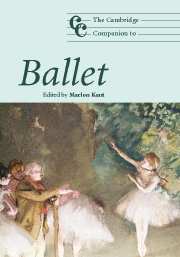Book contents
- Frontmatter
- Introduction
- Part I From the Renaissance to the baroque: royal power and worldly display
- Part II The eighteenth century: revolutions in technique and spirit
- 5 Choreography and narrative: the ballet d'action of the eighteenth century
- 6 The rise of ballet technique and training: the professionalisation of an art form
- 7 The making of history: JohnWeaver and the Enlightenment
- 8 Jean-Georges Noverre: dance and reform
- 9 The French Revolution and its spectacles
- Part III Romantic ballet: ballet is a woman
- Part IV The twentieth century: tradition becomes modern
- Notes
- Bibliography and further reading
- Index of persons
- Index of ballets
- Subject index
- The Cambridge Companion to Music
7 - The making of history: JohnWeaver and the Enlightenment
from Part II - The eighteenth century: revolutions in technique and spirit
Published online by Cambridge University Press: 28 September 2011
- Frontmatter
- Introduction
- Part I From the Renaissance to the baroque: royal power and worldly display
- Part II The eighteenth century: revolutions in technique and spirit
- 5 Choreography and narrative: the ballet d'action of the eighteenth century
- 6 The rise of ballet technique and training: the professionalisation of an art form
- 7 The making of history: JohnWeaver and the Enlightenment
- 8 Jean-Georges Noverre: dance and reform
- 9 The French Revolution and its spectacles
- Part III Romantic ballet: ballet is a woman
- Part IV The twentieth century: tradition becomes modern
- Notes
- Bibliography and further reading
- Index of persons
- Index of ballets
- Subject index
- The Cambridge Companion to Music
Summary
Weaver's life
Weaver was born on 21 July 1673 at Shrewsbury in the county of Shropshire, where his father (also called John) was a dancing master. The family moved to Oxford shortly after John junior's birth. It is probable that he was sent back to Shrewsbury at about the age of ten to attend the eponymous school. He followed in his father's footsteps as a dancing master in the town until 1700 when he moved to London to work as a dancer in the theatres of the capital. Two years later he staged The Tavern Bilkers at Drury Lane Theatre, claiming later that it was “the first Entertainment that appeared on the English Stage, where the Representation and Story was carried on by Dancing, Action and Motion only”. He also worked closely with Queen Anne's dancing master, known simply as Mr Isaac, in notating the dances devised by the latter for court occasions. He enjoyed a mutually supportive relationship with the other major metropolitan dancing master of the period, Thomas Caverley. Important for his career as a writer was his friendship with Sir Richard Steele the Irish-born journalist and playwright who with Joseph Addison edited The Spectator (1711–14). Steele commissioned several articles on dancing for his periodical from Weaver, gave helpful publicity to his history of dancing (1712) and may also have had a hand in getting the book published in the first place. In 1707 Weaver had returned to Shrewsbury, where his wife Catherine, whom he had married in 1696, died in childbirth in 1712.
- Type
- Chapter
- Information
- The Cambridge Companion to Ballet , pp. 78 - 86Publisher: Cambridge University PressPrint publication year: 2007



